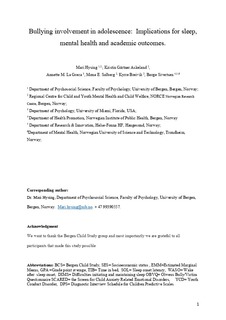Bullying Involvement in Adolescence: Implications for Sleep, Mental Health, and Academic Outcomes
Hysing, Mari; Askeland, Kristin Gärtner; La Greca, Annette M.; Solberg, Mona Elin; Breivik, Kyrre; Sivertsen, Børge
Journal article, Peer reviewed
Accepted version

View/
Date
2019Metadata
Show full item recordCollections
- Institutt for psykisk helse [1197]
- Publikasjoner fra CRIStin - NTNU [37186]
Abstract
Adolescents’ involvement in bullying is associated with both sleep and mental health problems, but the nature of this association remains unclear; further, its association with academic outcomes has received little attention. Thus, the aims of the current study were to (a) determine whether involvement in bullying as a victim, bully, or bully-victim was associated with greater sleep and mental health problems and (b) explore the potential mediating effect of sleep and mental health problems on the association between bullying and academic outcomes. A large 2012 population-based study in Hordaland County, Norway, surveyed 10,220 adolescents (16-19 years; 54% girls) about bullying involvement using the revised version of the Olweus Bully/Victim Questionnaire, detailed sleep assessment, and mental health questionnaires. Academic outcomes were obtained from official administrative registries. 1.7% of the adolescents (n = 156) reported being victims of bullying, 1.0% (n = 92) reported being a bully, and 0.5% (n = 50) reported being a bully-victim. All categories of bullying involvement had higher rates of mental health problems compared with adolescents not involved in bullying. Victims reported more symptoms of anxiety and depression, whereas bullies reported higher rates of conduct problems. Adolescents in all bullying categories also reported significantly shorter sleep duration and higher prevalence of insomnia as well as lower grade point average (GPA) compared with adolescents not involved; however, school absence was not associated with bullying involvement. Bullying involvement and GPA showed complete mediation for bullies and bully-victims and partial mediation for victims through sleep duration, conduct problems, and symptoms of depression and attention deficit hyperactivity disorder (ADHD). Bullying is strongly associated with mental health and sleep problems, in addition to lower academic performance. Findings support the importance of addressing bullying involvement during this important developmental period.